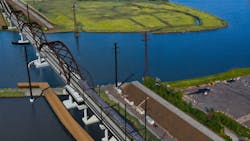New Amtrak OIG report shows Amtrak has opportunities to improve support of NJ Transit on Portal North Bridge project
According to a new report from the Amtrak Office of Inspector General (OIG), even though the Portal North Bridge project is on budget and on schedule as of January 2024, Amtrak has opportunities to improve its support of New Jersey Transit (NJ Transit), the lead sponsor on the project, and better oversee its own interests and reduce risks to the project.
The project is part of the $40 billion Gateway program to upgrade and replace rail infrastructure between Newark, New Jersey and New York City. In its report, the OIG found that Amtrak, in its supporting role, has opportunities to improve its processes and reduce risk to the project. Specifically, Amtrak did not anticipate demand for track outages and company labor, had differing expectations for information sharing with NJ Transit and did not initially staff its project team to effectively manage its work on the project.
According to the report, Amtrak is responsible for contributing about $495 million to the approximately $2.4 billion project, along with a portion of any cost overruns, and will ultimately own the bridge. Accordingly, Amtrak has a significant role in supporting NJ Transit in the bridge’s construction and has a vested interest in ensuring the project meets its requirements.
The report notes that at the project’s outset, however, Amtrak did not have a disciplined process to ensure its estimates for track outage and labor needs considered the project’s design and the methods a construction contractor may use to implement it. As a result, Amtrak significantly underestimated requirements, and going forward, the project could face cost and schedule risks if Amtrak cannot meet outage and labor demands.
To accommodate increased outage and labor needs, Amtrak established a maintenance outage schedule in the work area, has shifted train schedules to provide the construction contractor longer work windows and has increased the size of its workforce supporting construction, the report said. The types of risks with outage and labor demands are not unique to the Portal North Bridge, the OIG found, and will affect each project in the Gateway program.
In addition, Amtrak did not initially receive construction and financial information it requested from NJ Transit because it did not fully identify its information requirements at the project’s outset. Since then, however, NJ Transit has provided Amtrak direct access to the project’s document management system. In response to the report, Amtrak said that NJ Transit and the company have collaboratively overcome their early information-sharing challenges.
Internally, the OIG found that Amtrak’s project team was overtasked and insufficiently staffed to effectively manage its work on the project. During the OIG’s review, the “volume and scale of the work overwhelmed the project team,” the report said. In one instance, the project team had up to a nine-month backlog of cost data to review because more immediate needs, like outage and labor demands, limited the team’s capacity to conduct oversight work. Amtrak has since expanded its team and is adjusting future project staffing plans to incorporate the lessons it learns from the project.
The OIG recommended improvements to Amtrak’s process for identifying outage, labor and information needs at the outset of future projects. Additionally, it recommended that Amtrak assess and address where information-sharing expectations may continue to vary with NJ Transit. Going forward, the report said that lessons learned from Portal North Bridge can also contribute insights to Amtrak’s multi-billion-dollar portfolio of capital improvements.
In response to the report, Amtrak noted management agreed with the recommendations and outlined its actions to implement them. These actions include the anticipated hiring and onboarding by December 2024 of a director level position tasked with establishing a constructability process for capital projects, an explanation of ongoing process improvements regarding information sharing between Amtrak and NJ Transit and a commitment to incorporate enhanced information sharing requirements for all project agreements initiated after July 1, 2024.
More information is included in the full report, which can be downloaded here.
